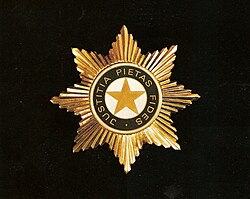| Honorary Order of the Yellow Star Ere-Orde van de Gele Ster | |
|---|---|
 Star of the order | |
| Awarded by | |
| Type | Order with five classes and two medals |
| Established | 25 November 1975 |
| Motto | JUSTITIA PIETAS FIDES (Justice Piety Fidelity). |
| Eligibility | Surinamese nationals or some distinguished foreign persons |
| Awarded for | Those who made important contributions to the Surinamese state or society |
| Status | Currently constituted |
| Grand Master | HE Dr. Jennifer Geerlings-Simons |
| Grades | Grand Cordon Grand Officer Commander Officer Knight |
| Precedence | |
| Next (higher) | None (highest) |
| Next (lower) | Honorary Order of the Palm |
| Ribbon bar of the order | |

The Honorary Order of the Yellow Star (Dutch: Ere-Orde van de Gele Ster) is the highest state decoration of the Republic of Suriname. The Order was instituted in 1975 at the independence of Suriname and replaced the Dutch Order of the Netherlands Lion. It is awarded to individuals for their meritorious service to the Surinamese people or nation. Foreigners are also eligible to receive the order. The president of Suriname is the Grand Master of the order.